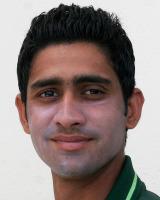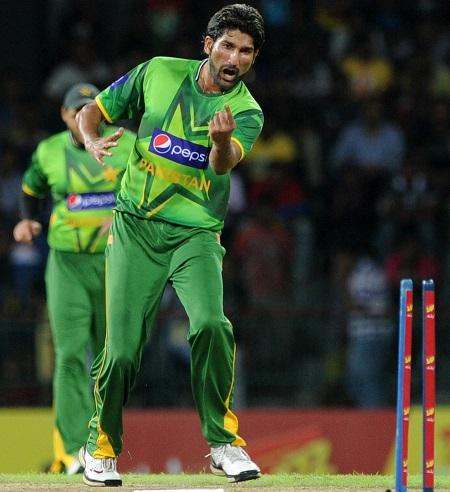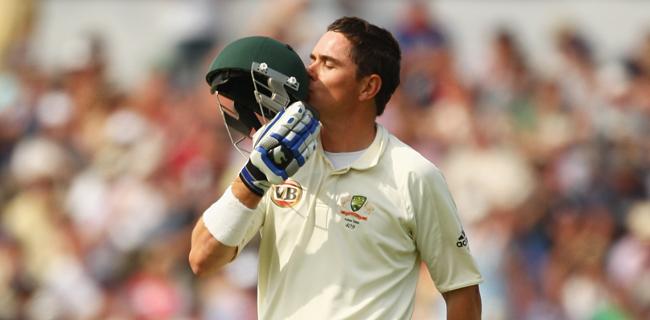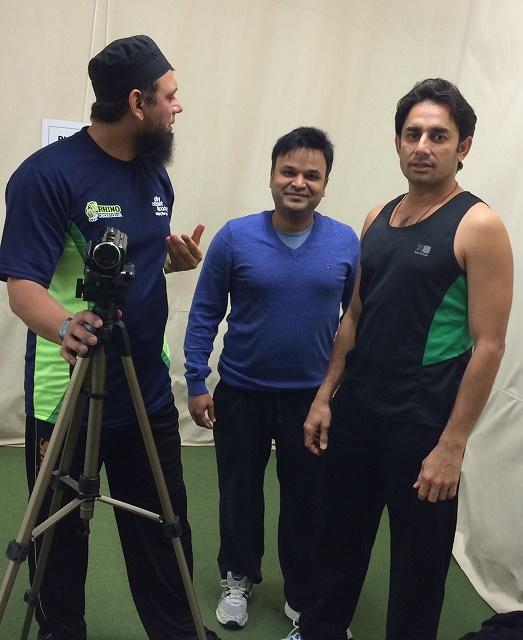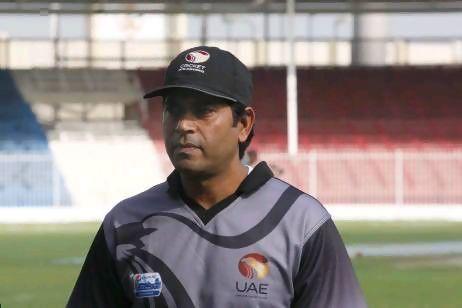Harsha Bhogle commentated in his first Test in 1985 and has since established himself as a household name in the world of cricket as a broadcaster, writer, journalist and television presenter.
Born in Hyderabad, his introduction to broadcasting came whilst commentating on Ranji Trophy games at university. This led to a stint at All India Radio and he subsequently went on to become the first Indian commentator to work for the Australian Broadcasting Corporation. A respected cricket analyst, he was also part of the BBC's commentary team in the 1996 and the 1999 ICC World Cups. More recently, Bhogle has been involved in the coverage of the Indian Premier League since 2009.
Also a journalist, he writes columns for a number of leading publications and has authored a biography on Mohammad Azharuddin.
Bhogle spoke to PakPassion.net about Pakistan's performance in the ICC Champions Trophy, the India-Pakistan group-stage match, India's chances of lifting the Champions Trophy, Pakistan's bowling attack and the change of mind set amongst India's leading cricketers.
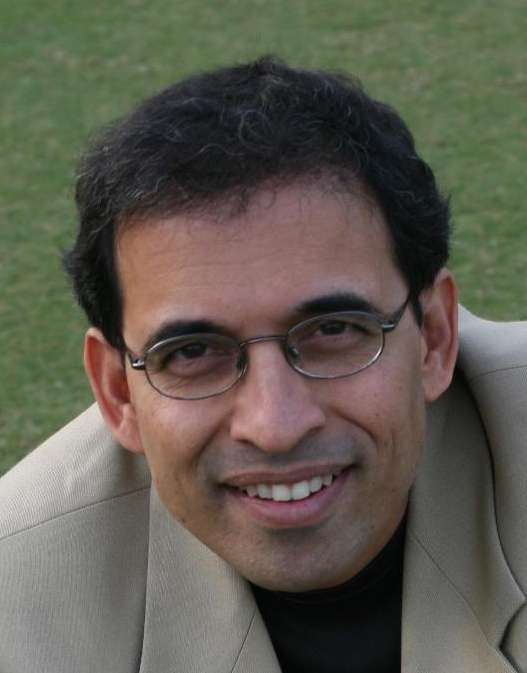
By Saj Sadiq (19th June, 2013)
PakPassion.net: A minority labelled the recent Pakistan-India match a dead rubber, but surely there's no such thing when the two teams face each other. Your thoughts on a rather one-sided game?
Harsha Bhogle: No, it wasn't a dead rubber until the weather turned it into a dead rubber. I've never seen a more lifeless, insipid India-Pakistan match. It's not the fault of either side, it's just that it was stop-start and you ended up waiting for it to end. In an India-Pakistan match you shouldn't be waiting for it to end. You enjoy the contest including the pain, the little moments of joy and you almost enjoy the frustration that is if you can enjoy frustration at all! Unfortunately, in this game we were waiting for it to end, given the weather and, I have to say, the weather was terrible!
PakPassion.net: Pakistan's record in the Champions Trophy: played three, lost three. The batting struggled and didn't post a score above 200 in any of the matches in the tournament. Were you surprised at just how poor they were?
Harsha Bhogle: Yes, I was - in fact I've always been bullish about Pakistan, so much so that people think I rate Pakistan more than I should. I think that we, in India, rate Pakistan higher than most other countries.
I have always had a hypothesis that Pakistan actually play better against India than other countries and so I asked Mohandas Menon my stats friend, who sent me the numbers that I was looking for. The numbers he sent were very revealing - Pakistan's runs-per-wicket in the last five years in one-day internationals is 26 but against India it's 36. They've made ten hundreds in 78 innings however, against India, they have made nine in eleven.
So I expected them to play better against India but there had to be someone around whom the batting revolved, someone who could say ?listen guys, big day, my day, bat around me? and I thought Misbah was that person. Nasir Jamshed is too young; I still think that Nasir Jamshed probably runs the risk of being overrated early in life because of the poverty (in batting) around him.
I have a lot of time for Jamshed and Hafeez, but I thought Misbah batting at three or four whilst controlling the batting, could take it through 50 overs. To be fair to him - and he did say that - given the stops and starts [due to rain in the Pakistan-India match], it was difficult to build an innings.
I was also disappointed because I grew up watching cricket in two different eras. When I was much younger it was Zaheer [Abbas], Asif [Iqbal], Javed [Miandad], Sadiq [Mohammad] and to a lesser extent, Majid [Khan], Imran [Khan] - that is the calibre of batting I recall. Then there was Saeed Anwar, even Salim Malik and Rameez [Raja] in the interim, but in Saeed Anwar and Inzamam-ul-Haq, you always had that big player. In a run chase you always wanted Inzamam in your side. To me, he was one of the world?s great unsung run-chasers. So it was disappointing to see that there was no-one of that class around there in the game against India.
I must be careful when I say this because it?s a bit rich coming from an Indian and people might misconstrue this, saying ?Listen, he?s just enjoying Pakistan?s discomfiture,? but the fact is that the current Pakistan team were almost like India, who arrived at the Champions Trophy and without Sachin Tendulkar, Rahul Dravid or Sourav Ganguly and could have just turned up to get knocked over.
PakPassion.net: There?s a lot of disappointment with the Pakistani performance from the media and the fans, particularly with some of the players who have had a lot of chances over the years. Do you think it?s time for the Pakistani selectors to put those guys aside and maybe inject some youth into the team like their Indian counterparts?
Harsha Bhogle: Well, its easy for me to say, but we are now in June so we are 20-21 months away from the 2015 World Cup. I remember in 2011, Dhoni had said he would make a decision on his future at the end of 2013 because he wanted whoever was going to lead India or keep wicket for India to have played at least 60-70 one-day matches before the 2015 World Cup. We were just trying to calculate how many one-day international caps India have let go since the last World Cup - if you count Tendulkar, Sehwag, Zaheer, Harbhajan, Gambhir, Yuvraj, there?s a lot of one-day caps that have gone!
If Pakistan are looking at the 2015 World Cup, is Shoaib Malik going to be playing the 2015 World Cup? Is Imran Farhat going to be playing the 2015 World Cup? Is even Misbah going to be playing the 2015 World Cup? If you go by Dhoni?s principle, that you need whoever is going to playing in the 2015 World Cup to have played 40-50 one-dayers before they get there, then the time to act is now.
I don?t know if there are young players available in Pakistan. I?ve been a fan of Umar Akmal since I saw him at the last Champions Trophy. In a close game against the West Indies, when West Indies had only made 80 or 90, Pakistan were 25 or 30 for 4 and in danger of imploding. He played a very mature innings but I?ve been disappointed with him after that, I thought by now he would have taken the strides that Virat Kohli has.
PakPassion.net: Were you surprised by the gulf between Indian and Pakistan? There seemed to be a huge gap in terms of confidence, technical ability when they faced each other in Birmingham?
Harsha Bhogle: I don?t know if that?s terminal or cyclical, because we used to see that when Pakistan were playing in India. There was always this great spirit with which they [Pakistan] played and we always thought somebody from Pakistan was going to come and win the game. I don?t know if it's cyclical because until not long ago, Pakistan had some very very good players.
It was here in England that Younis Khan and Mohammad Yousuf and all the others played brilliantly. I don?t know if it?s a cycle, but if you?re not finding players to push Shoaib Malik and Imran Farhat and Misbah or even Hafeez for that matter, then I think there?s a problem.
PakPassion.net: Put yourself in Misbah-ul-Haq?s shoes: you?ve done your utmost, you?ve fielded very well despite being the oldest player in the tournament and carried the batting in all three games. Would you want to continue in such a struggling side and prove you've got the ability to lead the team? Or would you say now is enough, bring somebody else in?
Harsha Bhogle: I?d still want to keep testing myself against everybody else. I?d like to have a successor but I don?t know if succession in Pakistan cricket is like that. In a sense, Imran Khan appointed his successors in Wasim Akram, and Waqar Younis and Aaqib Javed by getting them ready and by the time he went out, these people were ready. In a sense that was a wonderful transition, it is almost the kind which India seem to have in place for their batting.
To be honest, I know Misbah?s intentions might have been noble but I think he took the safe option by batting at five. If he has to control the game, then maybe he has to control it from three or four. I thought he was maybe taking the safer option - batting at five is a lot easier than it is to bat at three or four. But I thought he might have still controlled the game from his current batting position. I can understand if he wanted Hafeez at three then he bats at four, though Hafeez should really have been opening the batting. I just thought that if he has to control the innings, then he needs to control it from much higher up the order.
Shoaib Malik is out of form, Kamran Akmal you don?t know when he?s coming and when he?s going and then suddenly this Pakistan side doesn?t have an Abdul Razzaq or Shahid Afridi. So suddenly you?re looking at Wahab Riaz and Saeed Ajmal batting at eight and nine, so I think five was too low for Misbah.
If I was Pakistan?s Chief of Selectors, I would sit with Misbah and say to him ?Can you keep your fitness for 18 months? If you can keep your fitness for 18 months, we will build a team around you and we say goodbye in 2015. If I?m not convinced about your fitness and staying around, I don?t want a new captain 12 months from now.? The new captain has to either be appointed now, or the current one has to go all the way.
As far as Hafeez is concerned, he almost wins a place in the side as a bowler and is good enough to bat in the top three so if we?re not sure about Misbah going all the way to 2015, they need to give Hafeez 12 months as captain, but it?s easy for me to say this about another team!
PakPassion.net: The knives seem to be out for Pakistan coach Dav Whatmore and after this tournament, the honeymoon period seems to be over. How much responsibility does a coach have, for such a debacle as we have seen from Pakistan in this tournament?
Harsha Bhogle: That would be the case if he was a football-style manager, as in a football-style manager where he decides who plays and who doesn't or who plays in which position. But in our part of the world, I don?t know in Pakistan but certainly in India, we overrate the role of the coach. In my view, it?s a captain?s team. The coach prepares the team, the captain takes it out, but because of our over-reliance on parents and on teachers when we are growing up, we always want people to tell us what to do rather than figure out how to do it ourselves.
I think a good coach creates the environment for people to figure out what to do themselves. If a coach is not producing results, you can?t sack the coach but keep the same players, but who?s going to do that? There?s no head of the PCB either and I read that Mohsin Khan wants to go to the Prime Minister, but I?m sure the Prime Minister has better things to do than worry about the cricket!
I think we in India have been lucky that cricket is the only sport that has stayed outside the political system. We have been very very lucky on that count. Someone, somewhere, asked for autonomy and it has stayed away from the government so we don?t have bureaucrats sitting in control over our cricket. So, we don?t have people sitting in the Sports Ministry in control of our cricket and for all that?s happening around our cricket, it?s still pretty well run at grass-roots. I think if I was a genuine well-wisher of Pakistan cricket I?d want it to go away from the Generals and the bureaucrats.
PakPassion.net: On the positives, and there?s only been a few for Pakistan in this tournament, how demoralising must it be for the fast bowlers like Irfan, Wahab, and Junaid to see the batsmen struggle so much given they?re putting in massive effort in every delivery for their country?
Harsha Bhogle: I would say, even more so for Saeed Ajmal! Saeed Ajmal is now 35, he is probably going to go up to the 2015 World Cup but you don?t know beyond that. Saeed Ajmal was a late starter, but he?s probably already played his best cricket for Pakistan. For him, there?s probably even more hunger to start winning things before he finishes.
I think Pakistan should be a little careful with Junaid. I?ve seen two or three bowlers in recent times for Pakistan who have come up the curve and haven't become the bowlers they should have become. Whereas even an Aaqib Javed, who played in the shadows of Wasim and Waqar, actually became a very good bowler.
I thought Umar Gul would have been a bigger bowler. He?s been a very good bowler for Pakistan, but I thought he would go even higher. I thought that Sohail Tanvir might have but I don?t know what happened to him - I haven't followed that much of Pakistan cricket. Then we have Amir and Asif who, for all the wrong reasons, didn?t become what they should have become. I hope the environment is such that Junaid can become the bowler he can become.
Fact is that Junaid with the ball to me looks like a Virat Kohli with the bat! We saw him in India when he played against India in Chennai. India was 29/5 and Junaid might have taken three or four out of those, moving it both ways. He had people like Virat playing down the wrong line and knocked over. Pakistan still won the game, even though Dhoni made that brilliant hundred. That?s where his talent was on show for all to see. He can take it away and he can swing it back in - he looks like someone who can become a very big bowler, I only hope the environment allows him to become that bowler.
PakPassion.net: We?re seeing a different brand of Indian cricketer, an ?in your face? swagger that some of the former Pakistani cricketers had. You?re seeing that with the Shikhar Dhawans and the Virat Kohlis. Is that something you?ve picked up on?
Harsha Bhogle: They definitely are. That started with Zaheer, Harbhajan, Yuvraj and that generation and it?s going through in this one. One of my friends in Pakistan told me something very interesting. He told me that, ?India has become the new Pakistan.? I think it?s a statement that you can laugh off, but it?s something to think about.
When I was growing up and I saw Pakistan play India, they always seemed to take the field believing, ?OK, it?s our game. How are we going to win it?? This was through the late ?70s and early ?80s. I see that in the Indian team of today. I see that in Shikhar Dhawan who?s not afraid and it?s not just Shikhar Dhawan and Virat Kohli. You see that down the line with the younger batsmen who are coming through as well. You see that in Dinesh Karthik and you see that in Ambati Rayudu, who?s not here. You see that with a lot of other players.
Although, a slightly more sober fellow, but you also see that in Ajinkya Rahane. These are all tough kids who have come out now. I think it?s a new generation in India that?s very secure of its place in the future. They make a lot of money and that gives them security and swagger. It also becomes an enemy if it?s not handled very well. Money is a big issue in Indian cricket. It?s giving them a lot of confidence and a certain place. It gives them respect and their future is being taken care of. There are a lot of pluses of the IPL and there?s a few negatives too, but I think that [swagger and confidence] is either a generational thing, or it could be because of the IPL.
PakPassion.net: You just touched upon an interesting point with regards to swagger and attitude. Are you surprised by how ?in the face? of the opposition some of the young Indian players are?
Harsha Bhogle: I?m even more surprised that people in Pakistan are talking that much about it. It?s almost as if fans and spectators in Pakistan are starting to get affected by the addition of swagger that some of the Indian players are showing. I mean, you see that with Ashwin too.
Normally, the people that come from the South are simple, laid-back, and slightly more well-behaved players such as the Rahul Dravids, VVS Laxmans and Anil Kumbles. These are the ones that come from Hyderabad, Bangalore [South India]. However, if you look at todays cricketers like Ashwin, Ravindra Jadeja - they are even fast bowlers or number one batsmen but they all have an ?in your face?? attitude. I think it?s the kind of aggression that Dhoni allows - Dhoni is the centre of it all.
You will see this in Indian industry. There are a lot of ambitious young entrepreneurs coming through in business. It?s my theory that the number of entrepreneurs coming through is symbolic or an indicator of the confidence of a society. When you?re not sure if you want a job and want to invest in bonds or you?re very confident and secure then you possibly invest in equities but you can also put away your money and become an entrepreneur.
The more entrepreneurs there are is a sign of confidence in a society. We?re seeing a lot of that in India at the moment. A lot of young people want to become entrepreneurs and we are seeing a manifestation of that trend in Indian cricket as well in the way these people are playing. This is, however, only true for the shorter game as we haven?t seen that happen in the five-day game. Its really 50-overs where India probably plays its best cricket - not even in T20Is. We?re seeing that kind of confidence more and more in this format of the game. I?d like to see that in Test cricket too, but I?m not sure that?s there - I think 50-overs is Dhoni?s favourite format.
PakPassion.net: India vs. Pakistan, we saw the brilliant atmosphere with the fans interacting with each other. Would you like to see, at some point in the near future, India and Pakistan playing more often?
Harsha Bhogle: Of course, it would be good for both sides. When you?re playing pressure cricket, you can only become better or become found out and easily replaced by someone else. As some people in India say, we?ve lost so much to Pakistan, it?s a great time to play them now! Because you [India] have a better chance of winning if you play now.
What I worry about is the impact it has on people. In Birmingham, it was brilliant. Somebody told me that you could put Indian and Pakistani supporters in the same stand and they could watch a game together. You couldn?t do that with Manchester United and Liverpool. I thought that was excellent.
The only place I did not enjoy watching Indian and Pakistani supporters together is in Sharjah. Sharjah got very vicious and it became very religious. It was segregated. The chants were ?Allah hu Akbar? on one side and ?Ganpati Bappa Morya ? on the other side and it became very vicious. But everywhere else, it?s been brilliant. I?d like to see a stage where they go hard supporting their side, and then just laugh it off and have a little jibe at each other in good spirit.
What I liked the other day was that Junaid bowled a ball that beat Shikhar. Junaid went and gave him a look and Shikhar had a big smile, and Junaid smiled and walked back. I thought that was great - ?I bowled a ball to try and get you out? and ?I?ve acknowledged the ball was too good for me. You didn?t abuse me. I didn?t scream back. But we both acknowledge each other and walk away.? That is how cricket is meant to be played.
PakPassion.net: Coming back to the Champions Trophy, India is through to the semi-finals with a 100% record. They are the favourites in the eyes of many. Do you think they?ve got what it takes to win this tournament?
Harsha Bhogle: They came here as underdogs - certainly in my eyes. They are still number one on the ICC rankings, but we didn?t think they had the bowling to win the tournament. We didn?t think that in these damp, seaming, and swinging conditions, that India?s batsmen would be able to put runs on. They also started badly in the warm-up games. It still depends on how India bowls. Most importantly, are they willing to play as front-runners as well? Some people are very good when there are no expectations of them. Some people are very good when people expect them to win. They have a swagger that they?re going to win and create an effect in the opposition?s dressing room. To me, it would be a very good indicator of how India play when they?re expected to win. But India is playing 50-overs cricket very differently from everyone else. It surprises me how the English commentators who follow the game very closely are sitting here and thinking, ?Hang on, there?s something different happening here.? It is basically unusually gifted batsmen backing themselves. I think India are well placed to win this. Whether they actually go and do it, we?ll wait and see.
PakPassion.net: Many thanks for your time today.
Harsha Bhogle: My pleasure.
